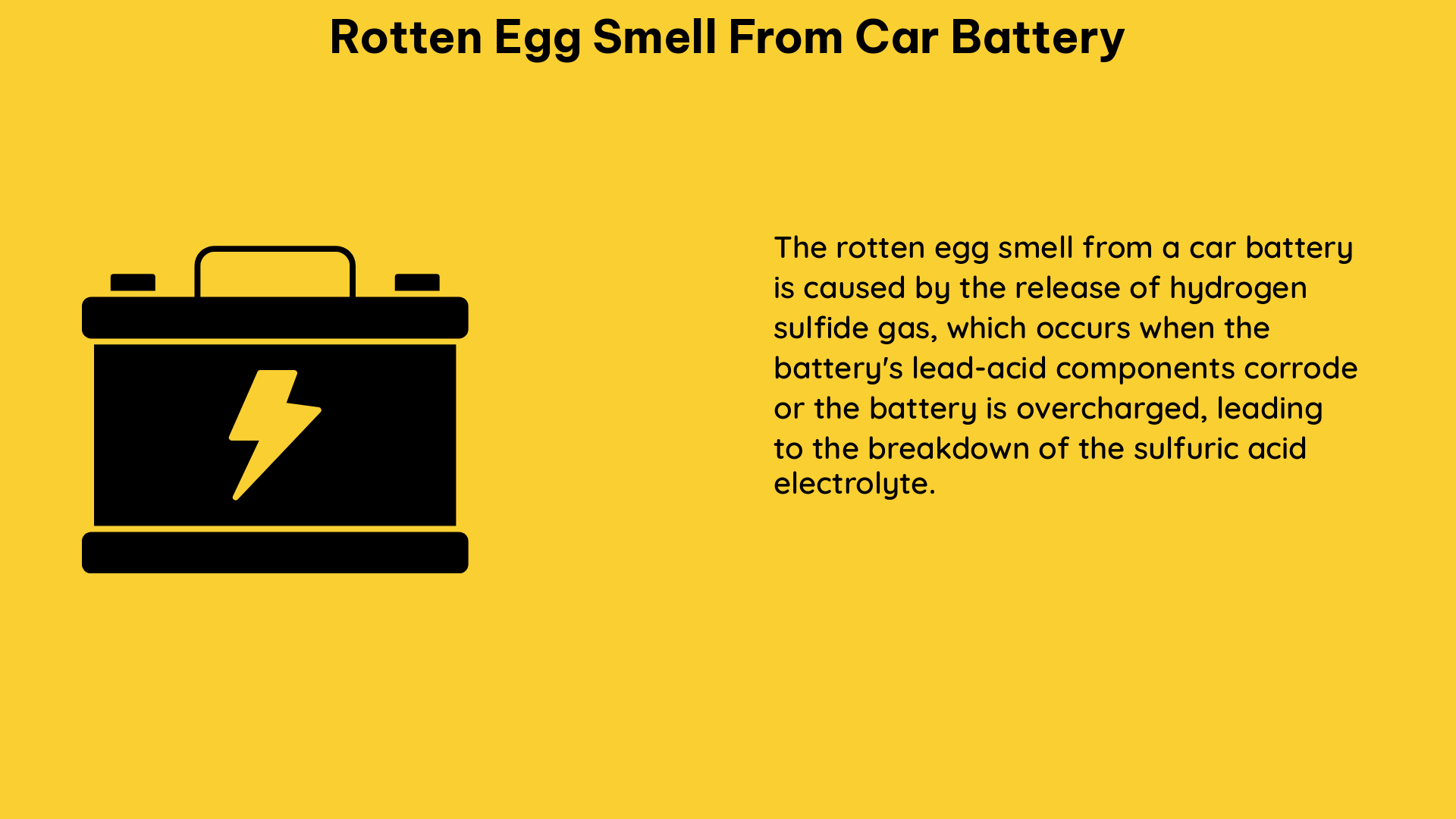The rotten egg smell emanating from a car battery is a clear indication of a serious issue that requires immediate attention. This pungent odor is caused by the emission of hydrogen sulfide (H2S), a highly toxic gas produced as a byproduct of the chemical reactions within the battery. Understanding the underlying causes, potential risks, and effective troubleshooting steps is crucial to maintaining the safety and performance of your vehicle’s electrical system.
Causes of Rotten Egg Smell from Car Battery
-
Overcharging: When a car battery is overcharged, the excess voltage can cause the electrolyte solution (a mixture of sulfuric acid and water) to break down, leading to the release of hydrogen sulfide gas.
-
Sulfation: Over time, the lead plates inside the battery can become coated with lead sulfate, a byproduct of the chemical reactions. This sulfation can inhibit the battery’s ability to accept a full charge, resulting in the production of hydrogen sulfide.
-
Battery Damage: Physical damage to the battery, such as cracks or leaks, can allow the electrolyte solution to come into contact with the lead plates, triggering the release of hydrogen sulfide.
-
Bacterial Contamination: In some cases, the rotten egg smell can be caused by the presence of sulfur-reducing bacteria within the battery, which can metabolize the sulfur compounds and produce hydrogen sulfide as a byproduct.
Risks Associated with Hydrogen Sulfide Exposure

Hydrogen sulfide is an extremely hazardous gas that can pose serious health risks, even at low concentrations. Exposure to this gas can lead to the following:
-
Respiratory Issues: Inhalation of hydrogen sulfide can cause respiratory distress, including coughing, shortness of breath, and in severe cases, respiratory failure.
-
Neurological Effects: Exposure to high levels of hydrogen sulfide can lead to central nervous system effects, such as dizziness, headaches, and unconsciousness.
-
Cardiovascular Problems: Hydrogen sulfide can interfere with the body’s ability to utilize oxygen, potentially leading to cardiovascular issues like low blood pressure and heart rhythm abnormalities.
-
Ocular Damage: The gas can also irritate the eyes, causing redness, pain, and even temporary blindness.
Troubleshooting and Mitigation Strategies
-
Battery Testing: If you suspect a rotten egg smell from your car battery, it’s essential to have the battery tested by a professional. They can use specialized equipment to measure the battery’s voltage, current, and specific gravity, which can help identify the underlying issue.
-
Battery Replacement: If the battery is found to be damaged or severely sulfated, it may need to be replaced. Attempting to charge a severely compromised battery can increase the risk of hydrogen sulfide production and further damage.
-
Charging System Inspection: The vehicle’s charging system, including the alternator and voltage regulator, should be inspected to ensure that the battery is not being overcharged. Proper charging system maintenance can help prevent the overproduction of hydrogen sulfide.
-
Ventilation and Containment: If a rotten egg smell is detected, it’s crucial to ensure adequate ventilation in the area and avoid prolonged exposure to the gas. In severe cases, the vehicle may need to be towed to a repair facility for safe handling and remediation.
-
Battery Maintenance: Regular battery maintenance, such as cleaning the terminals, checking the electrolyte levels, and ensuring proper charging, can help prevent the buildup of sulfation and reduce the risk of hydrogen sulfide production.
-
Protective Gear: When working with a battery that is emitting a rotten egg smell, it’s essential to wear appropriate personal protective equipment (PPE), such as gloves, goggles, and a respirator, to minimize the risk of exposure to the toxic gas.
Conclusion
The rotten egg smell from a car battery is a clear indication of a serious issue that requires immediate attention. By understanding the underlying causes, potential risks, and effective troubleshooting strategies, you can take proactive steps to maintain the safety and performance of your vehicle’s electrical system. Remember, addressing the problem promptly and following proper safety protocols is crucial to prevent the harmful effects of hydrogen sulfide exposure.
References:
- Why Does My Car Smell Like Rotten Eggs? | Cars.com. (2023-04-23). Retrieved from https://www.cars.com/articles/why-does-my-car-smell-like-rotten-eggs-464899/
- Why does my car smell like rotten eggs? – WhoCanFixMyCar. (n.d.). Retrieved from https://www.whocanfixmycar.com/advice/reasons-for-a-rotten-egg-smell-in-car
- Car Battery is starting to get that “rotten egg smell” and won’t hold a … (2010-10-17). Retrieved from https://www.justanswer.com/car/444nd-car-battery-starting-rotten-egg-smell.html
- YSK: Your vehicle’s battery can produce a deadly toxic gas called … (2022-04-21). Retrieved from https://www.reddit.com/r/YouShouldKnow/comments/u8pooh/ysk_your_vehicles_battery_can_produce_a_deadly/
- Rotten Egg Smell/ brand new batteries. – Cruisers & Sailing Forums. (2021-01-17). Retrieved from https://www.cruisersforum.com/forums/f14/rotten-egg-smell-brand-new-batteries-245239.html

The lambdageeks.com Core SME Team is a group of experienced subject matter experts from diverse scientific and technical fields including Physics, Chemistry, Technology,Electronics & Electrical Engineering, Automotive, Mechanical Engineering. Our team collaborates to create high-quality, well-researched articles on a wide range of science and technology topics for the lambdageeks.com website.
All Our Senior SME are having more than 7 Years of experience in the respective fields . They are either Working Industry Professionals or assocaited With different Universities. Refer Our Authors Page to get to know About our Core SMEs.